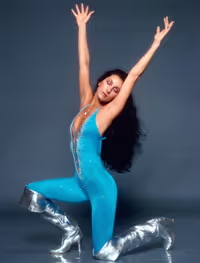"Big musicals" that could be done with a small cast
#25Musicals
Posted: 6/29/14 at 8:00am
broadwayguy2, as with directorial "concepts", I think the rights holders probably have a legal right to withdraw rights when the doubling rises to the level of fundamentally changing the show.
Obviously, the HAIRSPRAY authors and MTI have made an allowance, though I must admit I really don't understand how the show can make any sense with a white Mabel, Inez and Seymour.
On the other hand, the published edition of CLOUD NINE includes an essay by the author explaining how Act I and Act II characters were originally doubled, but encouraging other productions to experiment with different combinations.
broadwayguy2
Broadway Legend Joined: 5/18/03
#26Musicals
Posted: 6/29/14 at 8:32am
No instamce of "doubling" in hairspray could fundamentally change the show.
The doibling of the Authority Figures is, in my opinion, perfect as is and as conceived by the original director and I love the statement made with that doubling, but splitting them upmor changingbthe doubling does not fundamentally change the show and authors made their opinion to that effect known quite a long time ago.
Personally, I do not agree with a color blind Hairspray, but if you go to the MTI site and read the letter, you will see that the idea comes from the knowledge that some amateur groups do not have the proper racial make up as dictated by the script, but they still view the show as a valuable tool to open a line of dialogue. This allowance is intended for THOSE amateur groups. To be fair, I think a c
Ever director could make it work with the idea of seeing the world through Tracy's eyes, where she notes no difference between race, and therefore REALLY alienating the race-specific outlook that Velma has toward the world.
If specific doubling is critical to the show, it will be painfully obvious in the writing.
To note another instance of race specific casting being changed, All shook Up relies heavily on race, but the authors include, in the published libretto, alternate dialogue that removes the issues of race and makes it instead about class, allowing for a white Sylvia and Lorraine.
#27Musicals
Posted: 6/29/14 at 12:39pm
I have seen "Dear World" done with a cast of less than 10, that I thought was brilliant.
I have seen a small cast do "Damn Yankees", not sure exactly how many, but not more than 16. I have seen "Evita" done with about the same number.
Not really a big show "Drowsy Chaperone" (17), but I have seen it done with 13.
I think "Chicago" could be cut to 13, with creative doubling...
I think "Dirty Rotten Scoundrels" could be also be cut to 13.
I think I have only seen "Sunset Blvd" with casts < 15.
Updated On: 6/29/14 at 12:39 PM
brdway411
Broadway Legend Joined: 2/24/14
#30Musicals
Posted: 6/29/14 at 7:57pm
No instamce of "doubling" in hairspray could fundamentally change the show....
That's a very broad statement, broadwayguy, but I don't have time to examine the libretto to prove you wrong. I'd argue that almost any show could be radically altered through some doubling choices.
I understand the rationale of the HAIRSPRAY authors, but I disagree. If I didn't know their work in other contexts, I'd suspect them of crass commercialism.
But given who they are, I'll assume they mean what they say. Nonetheless, I think we'd all be better off if amateur groups were encouraged to reach out to African-American actors rather than letting white actors play roles where "blackness" is essential to the character.
#31Musicals
Posted: 6/29/14 at 9:20pm
Chicago:
Roxie Hart
Velma Kelly
Billy Flynn
Mama Morton
Amos Hart/Mary Sunshine
Fred Casely/D.A. Harrison
Mona (Cell Block)/Go To Hell Kitty
Liz (Cell Block)
Hunyak (Cell Block)
June (Cell Block)
Annie (Cell Block)
Maybe two more ensemble men?
Videos






